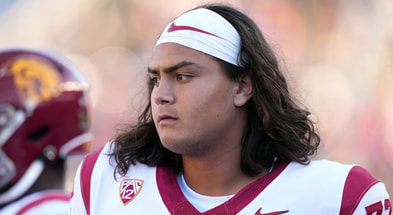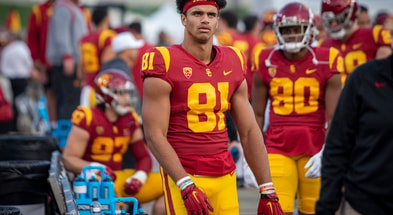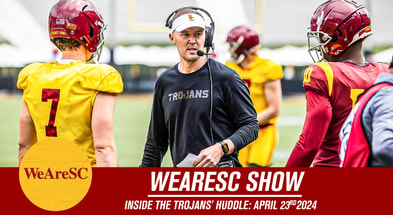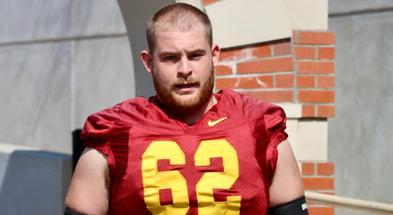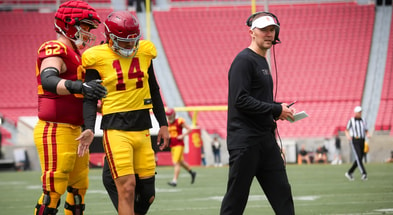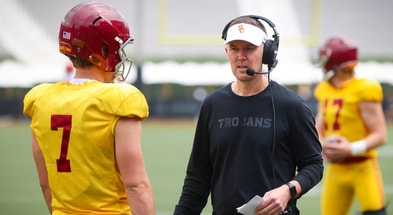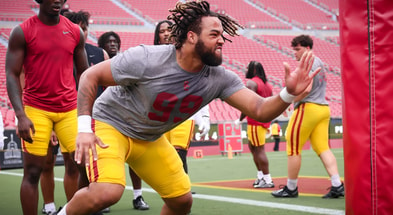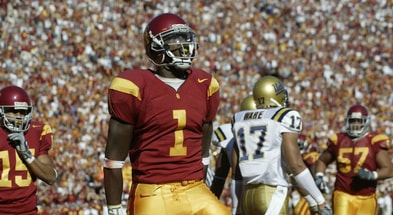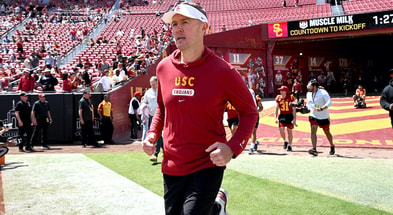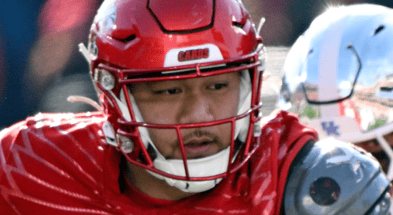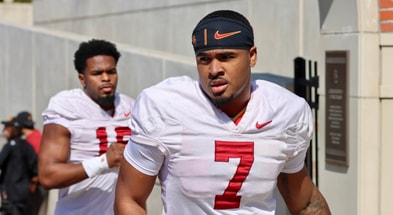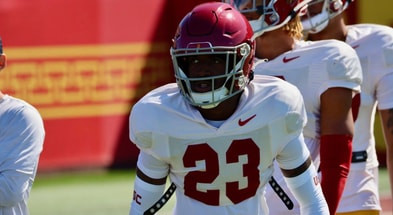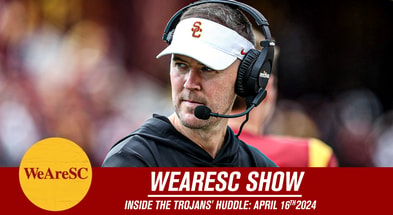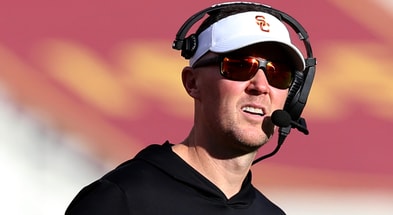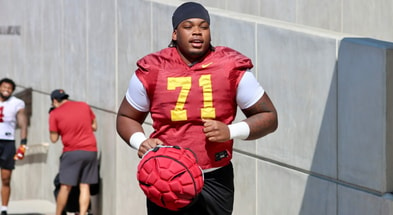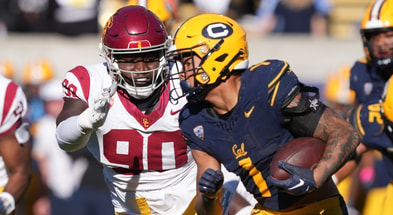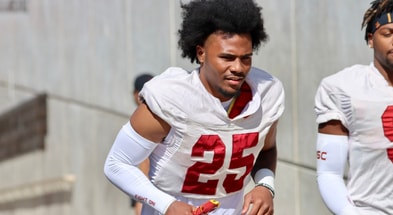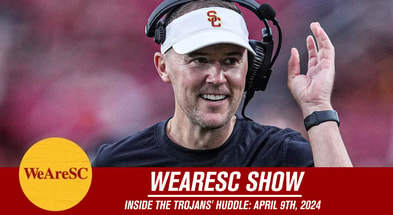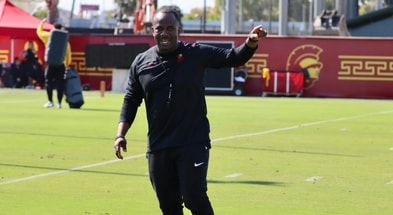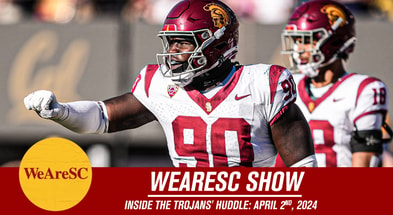Musings from Arledge: It's Okay to Love Football
USC fans are in a position they don’t want to be. We thought we had won the debate. For years, it was not clear that USC valued having an elite football program. Many of us thought the day of USC trying to compete with the Alabamas and Ohio States was a discarded relic of the past. When Mike Bohn and Carol Folt opened the checkbook and hired Lincoln Riley, that was a definitive answer that USC was, in fact, going to try to win in football and win big.
With Mike Bohn’s dismissal, we are now left to see whether the forces wanting to compete with the elite in college football are still in control. Not everybody wants it to be.
I don’t have to tell you that football is a wildly popular spectator sport. That’s obvious. The NFL is the most popular sport in the country, and there is no close second. College football can already make a strong claim to being the second most popular sport in America, and once the expanded playoff arrives, I think the sport is really set to take off.
But many people question whether football should be popular. At many universities, significant groups of faculty and administrators question whether competing at the highest level of athletics is really consistent with the university’s mission.
And as evidence of serious, long-term damage from head injuries continues to mount, many people ask whether we’re not just like the ancient Romans, cheering from the seats of the Coliseum as gladiators kill each other. Increasing numbers of parents are keeping their sons out of the sport.
There are serious objections here, especially the head injury issue. We must continue to research CTE. We must continue to make rule changes to make the game safer. I won’t try to settle those issues here. I would note only that we should be careful about extrapolating the findings related to NFL players with what happens at the lower levels. All football is not created equal. What happens in most youth and high school football is not equivalent to what happens in NFL stadiums. Just as what happens when you’re sparring at the local gym with an accountant or insurance salesman isn’t the same as facing Mike Tyson in the boxing ring or Jon Jones in the Octagon.
The question is, knowing what we know now, why should football be saved?
And today I want to make sure we remember what is on the other side of the ledger. I’m going to give a full-throated defense of football today. Not for how fun and entertaining it is for spectators. That requires no explanation. And I’m not going to argue that football is fun for participants. It is. But being fun doesn’t necessarily also make it valuable. There are a lot of fun things that are terrible for us.
I’m going to defend football as having value, apart from just being fun. I think football is an amazing teaching tool, as one of life’s great experiences and character-building enterprises. I think football offers something – to youth and to college students – that many of them will have a hard time finding anywhere else. I think it can also help to mitigate some of the worst features of modern life.
In the process, I’ll talk a little about my own experiences. This is why I’m wearing my William Jewell College shirt in the video. I hope you’ll forgive me. I don’t talk about my time playing high school and college football because there is something extraordinary about my career. Quite the opposite. I talk about it because – I can assure you – there was absolutely nothing at all extraordinary about it. It’s easy to see how Caleb Williams benefits from football. It’s harder to see how football benefits smaller and far less talented people – people like me – who never make a dime from football. But I think it does.
For many people, football may be the best teacher of critical life lessons, including how to work with and even love people who are very different from you, and the importance of hard work and delayed gratification. And how you must take advantage of your limited opportunities in life.
Let’s start with hard work.
I once read a commentator argue that the movie The Karate Kid ruined the world because it led a whole generation of kids to believe that a few months of effort would allow you to master anything. It’s true that Mister Miyagi’s teachings are more than a little unrealistic. I know from personal experience that you cannot master a martial art in a couple of months.
But it’s not Karate Kid that has threatened to ruin a generation of kids. It’s social media. It’s Tik Tok and Instagram. It’s kids seeing ditzy, silly girls making hundreds of thousands of dollars because they do little dances in a bikini. It’s kids seeing unrealistic and often false portrayals of very young people living flashy, fun-willed lives of the type that very few people can, and which even fewer people are able to do at a young age without years of work and effort.
My grandfather grew up on a farm in southern Oklahoma, just a few miles from the Red River. He didn’t grow up with any unrealistic expectations about the necessity of hard work or delayed gratification. He worked his butt off doing demanding, difficult labor. He learned that success – or, forget success – survival, is about hard work. It’s about doing things today that won’t pay off for many, many months, if ever.
Through the generations, as Americans have become richer – and we have; the standard of living for just about all Americans today is dramatically better than at any time or place in human history – it’s becomes easier to miss the lessons my grandfather learned naturally just by the nature of his family’s existence. Success is hard. It’s earned. It’s earned through sweat and discipline. And it takes years, years of struggle that will only pay off at some distant date in the future. People who learn those lessons have a huge leg up in this world.
I grew up in a middle-class family in middle-class neighborhoods. We weren’t wealthy. But I didn’t go hungry, and I never had to worry that I would. And school came easily to me. I didn’t face a lot of struggle. But football – football was hard. If I wanted to have any chance to play football, with my lack of natural talent, I was going to have to work.
And I so badly wanted to succeed at football. I loved it. I loved everything about it. I loved it like nothing else. The rush of scoring a touchdown, of making a big hit. The rush of the pain, the violence. You see, football hurts. The bruises. The sore muscles. Taking a helmet to the wrist, hand, or elbow. Getting smashed under a pile. Wind sprints in hot, heavy gear in hundred-degree heat. Waking up during two-a-days and sitting in the wet grass on a dew-covered field as you try to stretch out a body that is still becoming acclimated to all the running, cutting, and hitting. A body that just wants ibuprofen and a bed.
And if you’re dedicated, if football really matters to you, the work is year-round no matter the circumstances. I remember the summer sprinting and lifting sessions with my teammates, doing one more sprint on the blistering grass when I would have preferred to be just about anywhere else in the world. And doing this no matter where I was. I remember my junior year of college, I was in an overseas study program in England, which allowed me to see much of Europe. I remember making sure I set aside time no matter where I was to get prepared. Finding weights (or weight substitutes) in Oxford. Looking for stairs in Rome or an empty strip of sand on a beach in Barcelona. Anywhere I could prepare. Because I wanted so badly to be good. I wanted to win. I wanted to be elected a team captain by my teammates. Those things mattered to me.
And you do all this hoping that at some point in the future it will pay off. And not really knowing if it will. We weren’t playing for NIL dollars or fame. I wish we were. We barely made scholarship money, and almost nobody wanted to watch us play. We were preparing just to play the game. Just for ourselves. (I’m starting to sound like Ivan Drago: For me! For me! ) We were playing just for hoped-for success on the field. In the early days in high school and college, I didn’t know how much I would even play. In the years, I knew I would be starting, but I never knew whether all the hard work would pay off with actual results on the field.
Sometimes it did. I played on some good teams. We won the league title my senior year in high school, pulled off some enormous upsets along the way (take that, Norco!), went a couple of rounds into the CIF playoffs. Those are amazing memories.
I also played on some terrible teams. We went 1-9 my senior year in college. We were awful. We couldn’t move the ball. Couldn’t score. Couldn’t stop anybody. It was grim. Every week became more of a challenge. Every week the temptation grew to slack off, to quit working so hard, to go through the motions and just wait for the season to end. Strangely enough, those are also amazing memories.
That’s the thing about the hard work that football requires. It’s not just about delayed gratification – a critical lesson for anybody to learn. It’s sometimes about the possibility of no future gratification at all. You never really know what fruits your hard work will bear. Kind of like life. My senior year I got hurt at the end of our third game. We were getting blown out by Benedictine College. The starters probably shouldn’t have been in the game. And I collided with our free safety, a very good friend of mine, trying to defend a pass in the end zone. His shoulder pads met my right knee. His shoulder pads won; my MCL lost. I had to sit out for a month – that’s a lot of time when it’s your last year of football – and when I returned, my already questionable speed and mobility were greatly compromised.
The hard work I put in before that senior season – and it was a lot – didn’t really pan out the way I had hoped. I missed games. I was limited when I came back. My team was awful. And I learned some important lessons that year. Lessons about hard work, about delayed gratification, about dealing with disappointment. Those were good lessons to learn.
We sometimes talk about the big-time USC recruits that don’t pan out the way everybody expected as if it’s a tragedy. And it may not be great for the program’s win-loss record or for those players’ dreams of NFL riches. But tragedy? Don’t be so sure. Football is only for a short time. Learning to live with and overcome bitter disappointment is a valuable life lesson that will pay dividends forever.
Football is not the only way to learn these lessons. But there is something special about football because of its physical demands. Football hurts in a way that basketball and baseball do not. It takes courage in a way that many sports do not. I’m not trying to denigrate other sports. I played basketball and baseball growing up. They’re great. They both take a lot of work. And courage. Taking a charge takes courage. Facing down a fastball takes courage.
But football is different. Choosing to crash full speed into a guy twice your size, one who would go on to play on the line at Notre Dame and in the NFL, as I did every day my sophomore year in high school, was different. I knew I could never win that battle. I knew I could never come close to a tie in that battle. The only thing I could never do was get smashed, pick myself up, and do it again. Or choose not try. Those were my choices. And choosing to try and fail, over and over again, to take the beating and keep fighting – that’s a special kind of learning opportunity.
I remember my main professor in college – he had never been an athlete – telling me that he had come to admire the football players in his classes because they were never afraid to take on a major challenge. Being willing to take on major challenges in a learned skill. Football teaches it well.
There are other sports that challenge you in this way, that demand you develop and display courage. Wrestling is brutal. Nobody is mentally and physically tougher than a dedicated wrestler.
But football has a benefit that wrestling does not. It is a true team sport. You don’t just practice with other guys and then compete as an individual. You play with a whole bunch of other guys, and you have to rely on them. You can’t win a football game by yourself. You can’t block an entire defense by yourself. You can’t cover all of the eligible receivers by yourself. You have to learn to rely on your teammates.
Our strong safety in college was a fantastic athlete. He really should have been playing at the D-1 level, and probably would have but for, frankly, questionable preparation habits. He would sometimes look over at me and say, “Cover me. I’m bitin’.” Now for those of you who don’t know what he meant, he was telling me that he was going to play recklessly aggressive. He was going to attack the offense even if he wasn’t completely sure what they were doing, without paying attention to his keys, and in the process might fail to cover his man. He was telling me to be ready to cover his man and mine.
This was always unwelcome news. I had a hard enough time covering my own man, and there was no way in the world I was going to cover both players. Fortunately, Mike was a superb athlete and an instinctive player. Often his over-aggressiveness paid off. Sometimes it backfired in spectacular fashion. Either way, we were in that mess together. We had to rely on each other. We had no choice.
That kind of teamwork is an important life lesson. But there is something special about the teamwork I learned in high school and college. My teammate, Mike, was from East St. Louis, from an absolutely appalling neighborhood. Mike and I grew up in very different places with very different lives. And it showed. Mike had no tolerance for social graces or standard courtesy. The first time I was introduced to Mike, he was an all-conference player and I was a new guy who had not proven anything and looked like I probably never would. Mike refused even to recognize my existence. He briefly looked at me, turned away, and walked away. It took a year before Mike was willing to recognize that I inhabited this earth at the same time he did. And another year after that before he would greet me, most commonly by flipping me off as we passed each other on campus. In Mike World, flipping somebody off as you passed them was the highest level of recognition, the equivalent of a bear hug and a kiss.
My teammates in high school were diverse. We had guys from lily-white suburbs. We had guys from Mexico. White, black, Latino. Rich, poor, and a whole bunch in the middle.
My teammates in college were more so. I was from California. We had guys from Dallas, Houston, Kansas City. Guys from one-stoplight towns in Kansas and Colorado that I had never even heard of. We had guys who planned to be doctors. We had guys who I’m not sure had ever been to a doctor. We had guys who grew up in the hood. We had guys who grew up in the country noodling, a shocking way to catch catfish that I found both frightening and fascinating.
In a day when far too many Americans are encouraged to and content to associate only with people who look like them and think like them, football didn’t give us that option. We were very different. And we weren’t just thrown into a room together. We were required to work together. To prepare together. To rely on each other. To share space with each other on the road. And in many cases we came to love each other like brothers.
That was a valuable experience and lesson.
And, finally, football teaches just how short life is and how few opportunities we have. Football teams don’t play many games. And it’s a sport that the vast majority of us can only play for a few years.
My senior year of college, our last game – Senior Day – was against a much better program,
Evangel College. We knew we were huge underdogs. I had never wanted anything more in my life than to play well and beat those guys. I was so fired up. In that mental state, I could have run through a brick wall. And I got a couple of nice hits. I also played recklessly and poorly. In my excitement, in my overhyped mental state, I made a series of horrible decisions. I tried to jump an out route and failed. I bit on the play action and let my receiver get behind me. I gave up two touchdowns that day. I had only given up one other touchdown all year. I gave up 14 points. We lost by 10.
When we got back to the locker room, I wept uncontrollably. I couldn’t stop. I wept because I thought I let my teammates down, my brothers. But most of all, I wept because I knew I would never again be able to play a football game. Kids who love piano can play piano all their lives. Kids who love to write or fish can do those things all their lives. But for us, for kids who loved playing football more than anything, we were done at 21, 22. They took our helmets away and sent us home.
You only have so many opportunities in life. It’s good to learn that early. Only so many chances to see your daughter’s play, to teach your son that important life lesson, to nail that job interview, only so many chances to give that powerful closing argument. For the most part, there are no mulligans. And it’s not enough to want to be good. It’s not enough to work hard to be good. Success takes those things, but it takes more than just those things – a lesson I learned the hard way on that field in Liberty, Missouri in November of 1994.
I make no apologies for my love of football. I had great parents. They taught me a lot. I had some very good teachers in high school, some great professors in college. They taught me a lot. But there are many lessons I would not have learned but from football. Football is not just a popular spectator sport. It’s not just potentially dangerous. It is those things. It is also one of the very best teachers I ever had and helped make me who I am.

